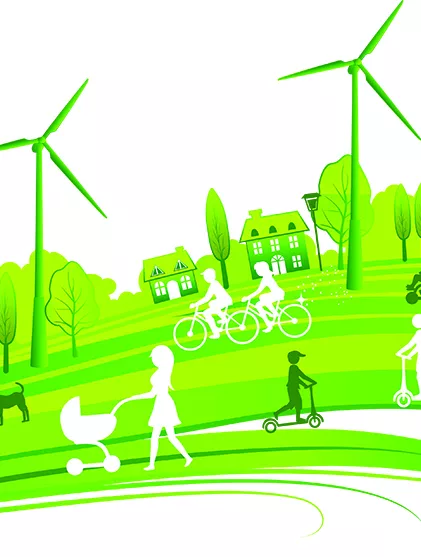
Climate change, pollution, and ecosystem maintenance are major environmental issues troubling scholars, but what about the local level concerns, like storm water runoff or water quality management?
Economics Professor David Ross merges economics and environmental studies in his 200-level economics class, the Economics of Local Environmental Programs. This Level I Praxis course allows students to work with local partners outside the College while also perfecting analytical economic skills and learning environmental studies policy.
"It's beyond producing work for class; this is work that actually gets to be used," says Ross. "Students are presented projects by local township officials and produce useful suggestions and policy implementations that local townships, like those in Chester County, can then implement to solve pressing environmental policy issues."
The course utilizes environmental economics to analyze human interactions with the environment, specifically on a local level. Assignments include persuasive writing, a policy memorandum, and Praxis project experience which connects students to local organizations to serve the community through their learning.
"While global environmental challenges are emphasized in the media, local communities and their challenges are key to understanding and mitigating environmental harm," says Ross.
Urban Studies major Helen Harman '20 took the class last year with an interest in environmental policy and planning.
"The experience of learning how to produce policy recommendations for townships in Pennsylvania gave me better insight into decision-making processes in environmental policy on a local scale," says Harman.
This semester, students are working specifically with townships within Montgomery and Chester Counties. Most recently, students visited the Haverford Reserve storm water reserve where guest speaker Kyle Schmeck of the Montgomery County Health Department spoke about septic system challenges.
"This course takes the core analytics and tools of introductory economics and narrows the usage and applies them to the field. With the Praxis experience, real life examples are added to make the experience even more engaging," says Ross.
Great courses don't just form overnight. Ross has been working on this course since 2009, adapting and growing the content with changing policy and scholarship.
"Each year I work to expand partnerships and respond to evolving challenges, scholarship, and politics to make the course relative and useful."
For students interested in the course, it is offered in the fall semester and requires the prerequisite of Introductory Economics and also fulfills requirements for the Environmental Studies program.
Praxis I Departmental Courses provide opportunities for students to explore and develop community connections in relation to the course topic by incorporating a variety of activities into the syllabus, such as field trips to local organizations, guest speakers from those organizations, and assignments that ask students to research local issues.
Bryn Mawr and Haverford joint department answering the analytical question, " How might we, individually and as a society, find new ways to understand and address the severe environmental challenges that now face our world? "